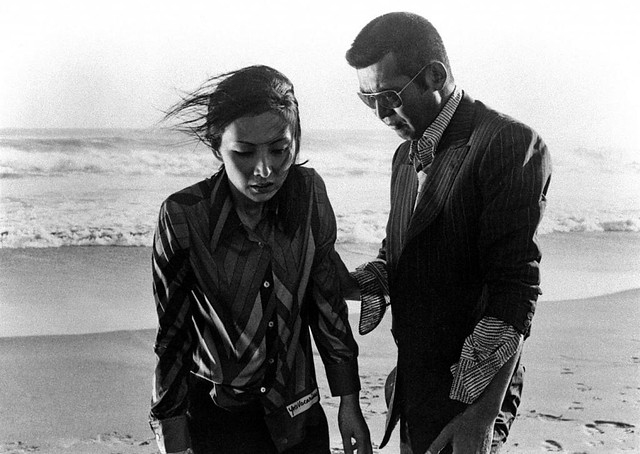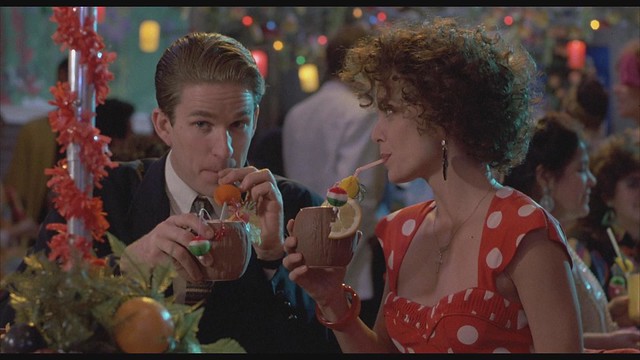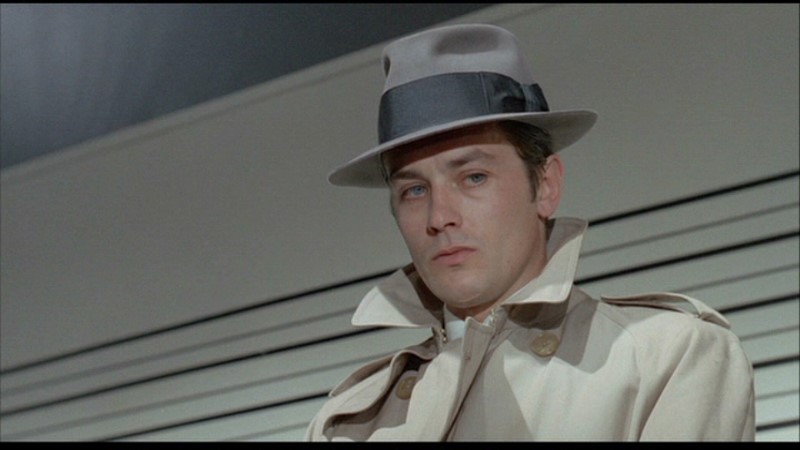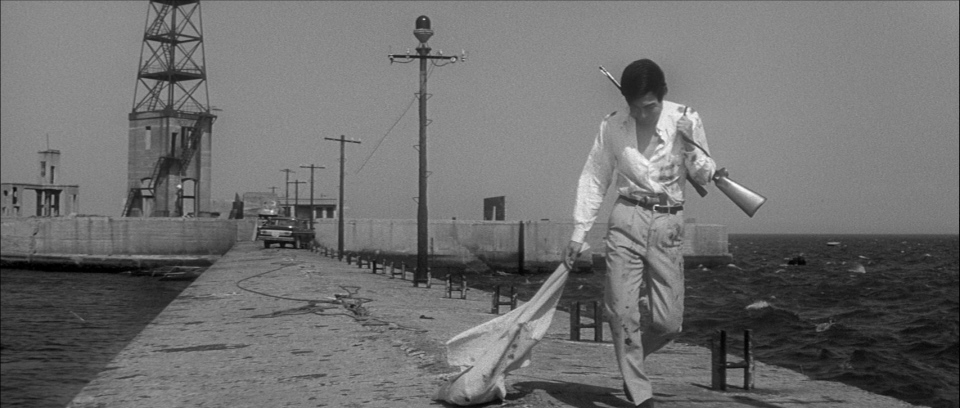I love the way that Kinji Fukasaku uses handheld. Lots of people do it his way nowadays (The Wrestler, Narc, The Bourne Series, etc.) but back then it was new. The only other filmmaker with a similar style was his American contemporary William Friedkin. It's not documentary and it's not French New Wave, it's something different. The camera is always in precisely the right place. It's never in danger of missing any crucial storytelling information. Yet, by virtue of the camera being handled, it's able to pull off all sorts of crazy shots to get an audience's adrenaline pumping. The camera swings wildly and can tilt or twirl at any moment. One could say that it's just as chaotic as the unpredictably violent world Fukasaku depicts in film after film. The perfect melding of style and substance.
Showing posts with label gangster. Show all posts
Showing posts with label gangster. Show all posts
Thursday, October 6, 2016
Yakuza Graveyard (1976)
I love the way that Kinji Fukasaku uses handheld. Lots of people do it his way nowadays (The Wrestler, Narc, The Bourne Series, etc.) but back then it was new. The only other filmmaker with a similar style was his American contemporary William Friedkin. It's not documentary and it's not French New Wave, it's something different. The camera is always in precisely the right place. It's never in danger of missing any crucial storytelling information. Yet, by virtue of the camera being handled, it's able to pull off all sorts of crazy shots to get an audience's adrenaline pumping. The camera swings wildly and can tilt or twirl at any moment. One could say that it's just as chaotic as the unpredictably violent world Fukasaku depicts in film after film. The perfect melding of style and substance.
Monday, May 30, 2016
Married to the Mob (1988)
The instant we meet Angela de Marco we know that she doesn't fit in this world. She looks the part of a mob wife with her big hair and hoop earrings, but there is a look in her eyes that tells us she wants more. She is distracted. She is somewhere else. She isn't like all the other catty broads in this beauty salon.
There were a lot of movies like this in the 80's, about trying to break out of the conformity. Usually it's a story about leaving behind square, yuppie suburbia for something more exciting. Jonathan Demme even made one of these films two years prior with the masterful Something Wild. But what makes this film stand out from the pack is the decision to substitute Reagan's America with the world of organized crime. It makes Angela's urge to flee a bit more understandable to the average viewer. It also makes a nice parallel between the Reagan Administration and gangsters. Bonus points for having a female protagonist. It's sort of odd that this is the film that preceded The Silence of the Lambs, but it also makes sense.
Labels:
comedy,
craig,
crime,
gangster,
romantic comedy
Monday, November 9, 2015
Election 2/Traid Election (2006)

My film collection is filled with all sorts of strays. Though there are now seven Fast & Furious films, I only own one and it's number five. Though I don't own Captain America: The First Avenger, I sure as heck own Captain America: The Winter Soldier. Sometimes this is a reflection on the quality of the film. For example, I don't see myself ever owning the first Sam Raimi Spider-Man. But sometimes the decision is simply economical.
As much as I enjoyed the first Election film, the second one is far and away the better film. It does everything that the first one does but in a more artful manner. Rather than repeating the manic chase film energy of the first outing, this one adopts the melancholic tone of a funeral dirge. And like The Godfather Part II, it expands beyond the borders of this insular society of gangsters to address sociopolitical issues of the world at large. Eventually I will own the first film, but when funds are limited, you have to go with the one that truly speaks to you.
Monday, September 28, 2015
Le Samouraï (1967)
I miss how international the cinema was in the 60's and 70's. It's somewhat coming back with studios making an effort to appeal to foreign markets by inserting one or two international actors into some Tom Cruise super-production...as minor stooges. But back in the day you would have French actors turn up in Italian films, Italian actors turn up in French films and directors of any nationality were more than happy to go wherever the money was.
I know that the Italians and their love of dubbing played a huge part in this, but I also feel like there might have been a greater focus on visual storytelling back then. Filmmakers like Alfred Hitchcock, Bernardo Bertolucci and Jean-Pierre Melville made films that could easily be watched silently. The story is being told with camera movement, editing, color palette and costuming. In this approach, the actors are more akin to a blank canvas on which both filmmaker and audience can project whatever they need to. Alain Delon is the king of this blank canvas style of acting. And I mean that as a compliment.
Thursday, June 11, 2015
Branded to Kill (1967)
After unleashing the psychedelic, technicolor, yakuza film Tokyo Drifter upon an unsuspecting public and studio, director Seijun Suzuki was warned to play it safe on his next film. They even forced him to shoot black and white in hopes that this might curtail some of his wilder impulses. Under pressure like this, most filmmakers would go out of their way to toe the company line and make their next film as generic as possible. Seijun Suzuki is not like most filmmakers. Suzuki instead turned his awkward situations into a psycho-sexual allegory the likes of which nobody had seen. Sure this film might seem tame in comparison to the current output of filmmakers like Takashi Miike, but you have to remember that nobody was doing stuff like this in 1967. A film about a hitman who gets off on the smell of boiling rice? A film about a hitman undergoing a complete psychological breakdown from the pressure of being hunted by another hitman as punishment for botching a job? Of course Suzuki was promptly fired and blacklisted from the Japanese film industry for a decade. But he survived and has made 11 films since. One of them was a gender-swapped remake of Branded to Kill titled Pistol Opera which he directed at the age of 80. The true rebel spirit never dies.
Monday, February 17, 2014
City Of God (2002)
There’s a lot to chew on in City of God, but what I found most intriguing was the evolution of the gangs in the film. Though everything is meticulously and excitingly depicted in the film, when I got to the end I still found myself baffled at how simple armed robbery was able to so quickly evolve into elaborate gang wars with excessive collateral damage? Seriously! In little more than a decade, the Cidade de Deus (d)evolves from something as (relatively) innocent as the quaintly named Tender Trio stealing gas canisters off a truck, to elaborate gang wars with excessive collateral damage. But then I guess that’s just capitalism. Someone invents the horseless carriage and before you know it there’s a billion-dollar industry and people fighting wars over the resource that makes those machines run. It doesn't matter if you’re from the favelas of Rio or the boardrooms of corporate America, the law of the land is survival of the fittest. Get your piece before someone else takes it. Kill or be killed. Isn't this a wonderful system?
Monday, December 9, 2013
The Killing Of A Chinese Bookie (1976)
A proud strip club owner (Ben Gazzara) is forced to come to terms with himself as a man, when his gambling addiction gets him in hot water with the mob, who offer him only one alternative.
* * *
For much of John Cassavetes directorial career, "genre" was a dirty word. Though funded by acting in stuff like Rosemary's Baby and The Dirty Dozen, Cassavetes actively avoided including things like guns and gangsters in his directorial output. He wanted to tell human stories about real people. It wasn't until he befriended a young Martin Scorsese that he came to realize that these things didn't have to be mutually exclusive.
For my money, The Killing Of A Chinese Bookie is the greatest film ever made about the sacrifices one must make in order to succeed in the arts. It says it all! Through the power of allegory, Cassavetes is able to stand up for all the independents out there and by using a character like Cosmo Vittelli as our stand-in, he is able to proclaim that all forms of personal expression are valid, no matter how silly they might appear to the outside world. This was John Cassavetes' poison pen letter to the "gangsters" who hold the purse-strings and make us jump through hoops, and of course the handwriting is impeccable.
Monday, March 18, 2013
The Godfather (1972)
Forget plot summary. What can one really say about The Godfather that hasn't already been said numerous times before and far more eloquently? It's a towering achievement, plain and simple. Great filmmaking, great storytelling, great acting. The fact that it emerged from so much studio chaos and doubt only makes it that much greater. As a film fan, I am always struggling with the debate between watching new films v. re-watching old favorites. At just under three hours, re-watching The Godfather will take up a sizable chunk of your day. Think about it: you could knock out two 90-min movies you've never seen in that same amount of time! But then again, what are the odds of either of those films being greater than The Godfather? Probably a billion to one. Though an equally great film did come along two years later in the form of The Godfather Part II, true masterpieces like this don't come along very often. It would be insane to only experience such greatness once in your lifetime. I look forward to watching this film and it's first sequel many more times before I leave this world. No matter what, that is time well spent.
Thursday, February 21, 2013
Goodfellas (1990)
The 1970s was a pretty crazy decade for Martin Scorsese. After the success of Mean Streets in 1972, the world was his. But as we have all learned from watching countless episodes of "Behind the Music", the good times don't always last. By the end of 1978, Scorsese was divorced for the second time and had to be hospitalized for internal bleeding stemming from his intense drug use and hard partying. Luckily for us film lovers, he was able to sober up and channel all his unhealthy impulses into making some of the greatest films this world has ever seen. In numerous interviews you can find Scorsese justifiably looking back on those wild years with shame and disgust, yet a closer look at one of his most beloved films seems to cast a slightly different palor on things...
Growing up, I never used to really think about what Goodfellas was ABOUT. Like young Henry Hill, I was too busy enjoying the music, the camera angles, the drugs, the dialogue and of course the violence. But now, as a man in his late 20s with some significant regret in his rearview mirror, things are starting to make a bit more sense. Today I find myself sympathizing with the older Henry from the end of the film.
See the hardest thing for me was leaving the life. I still love the life. I mean we were treated like movie-stars with muscle. We had it all just for the asking. Our wives, mothers, kids, everybody rode along. I had paper bags filled with jewelry stashed in the kitchen. I had a sugar bowl filled with coke next to the bed. Anything I wanted was a phone call away. Free cars. The keys to a dozen hideout flats all over the city. I'd bet twenty, thirty grand over a weekend and then I'd either blow the winnings in a week or go to the sharks to pay back the bookies. Didn't matter. It didn't mean anything. When I was broke, I would go out and rob some more. We ran everything. We paid off cops. We paid off lawyers. We paid off judges. Everybody had their hands out. Everything was for the taking. And now it's all over. And that's the hardest part. Today everything is different; there's no action... have to wait around like everyone else. Can't even get decent food - right after I got here, I ordered some spaghetti with marinara sauce, and I got egg noodles and ketchup. I'm an average nobody... get to live the rest of my life like a schnook.Just because it was dangerous, doesn't mean it wasn't fun!
Monday, July 30, 2012
Scarface (1983)
Observe the rapid rise of a Cuban immigrant named Tony Montana (Al Pacino) as he rises through the ranks of the Miami underworld. The world is his.
* * *
When I first saw this film I was absolutely ignorant of the politics at play. I simply just wanted to see a movie written by Oliver Stone and directed by Brian De Palma that people had told me was filled with crazy intense violence. 9th grade Craig was not disappointed. I plowed my way through that double cassette like it was nothing. It wasn't until 11th grade, when I became politically aware circa the 2000 Bush/Gore election, that I started to pay attention to that tagline on the poster: He loved the American Dream. With a vengeance. While it may look and sound like a gangster picture, Scarface is at heart, a vicious indictment of Ronald Reagan's America. A poison pen letter to laissez-faire. Tony Montana is the ultimate capitalist, Horatio Alger with a machine gun. Yet instead of inspiring political discourse, it inspired hip-hop videos. I guess there are more 9th grade Craigs out there than 11th grade ones. Le sigh....
Tuesday, June 12, 2012
Made (2001)
Bobby (Jon Favreau) and Ricky (Vince Vaughn) are sent to New York by their mobster boss. Hilarity ensues.
* * *
SPOLERS AHEAD!
Most twist endings are two-trick ponies. On the first viewing you get the joy of being taken by surprise. On the second viewing you get to notice all the little things you missed the first time. But beyond that, lies nothing. You never ever get to relive the surprise of that first viewing and admiring a filmmaker's cleverness gets old quick. Made avoids this pit-fall by simply having the "twist" be part of the film's natural progression of both character and style. Just as Ricky and Bobby realize that they aren't gangsters, the film realizes it's not a gangster movie. The change-over is perfect: a story that began in a boxing-ring ends at Chuck E. Cheese. How better to exemplify putting aside all the cocky posturing of your 20s and embracing adult responsibility? Cassavetes would be proud. Our baby's all grown up!
Wednesday, April 11, 2012
Casino (1995)
The unbelievable true story of how a professional gambler (Robert De Niro), his hooker wife (Sharon Stone) and a hot-headed gangster (Joe Pesci) inadvertently brought the mob's reign in Las Vegas to a screeching halt.
* * *
I consider myself fortunate to have seen this film before I saw Goodfellas. I was allowed to view Casino without the baggage of, 'that other film' to which it is so often compared. In fact I got to watch this film in a complete vacuum, as this was my first Scorsese film ever. Everything I love about his work, I first discovered here. And oh what a way to discover! In order to match the glittery excess of his principal location, Marty deliberately chose to ratchet-up his already hyperbolic style. The camerawork, the music, the violence, even the voice-over is over the top.This is Scorsese cranked up to 11! You don't even feel the 3-hour run-time. This movie beats you over the head and leaves you for dead. And just like the real Las Vegas, you find yourself crawling back for a second helping.
Thursday, September 1, 2011
Youth of the Beast (1963)
A wild and crazy gangster (Joe Shishido) blows into town and ruffles feathers playing opposing Yakuza bosses against each other.
* * *
Watching a film directed by Seijun Suzuki is an experience. It's loud, it's violent, it's beautiful, it's psychotic. As the film unspools you find yourself wondering how a film like this was ever able to be made! But then you stop and just appreciate the fact that it was made at all. Nobody makes films like Suzuki-san. Sure his films don't always make sense, but they ARE consistently engaging. There's always something beautiful or insane to look at. This man really knew where to put his camera. Though of course I recommend actually watching his films, I wouldn't hold it against you if you just let them play on the TV at a party.
Subscribe to:
Posts (Atom)




